
The world’s biggest shipbuilder sees China’s cleanup of its smoggy skies lifting prices of the vessels this year.
As China prioritizes dealing with the smog that has famously blanketed Beijing and other big cities, the world’s second-biggest economy is increasingly turning to liquefied natural gas as a replacement for coal for heating and other purposes, boosting imports of the cleaner fuel. Hyundai Heavy Industries Co. expects orders for carriers of the gas to lead demand for new ships, Chief Executive Officer Sam H. Ka said.
“China’s need for LNG appears to have triggered the restart of some gas projects in the U.S., Australia and Qatar,” Ka said in a phone interview from Seoul. “Our slots for LNG-carrier construction are pretty much filled up until 2021.”
Surging demand for LNG in China, as well as in smaller emerging economies, has spurred energy explorers including Royal Dutch Shell Plc and Total SA to focus on investments in gas development projects. The accompanying demand for carriers to transport the fuel is a bright spot for a shipbuilding industry that has struggled to win orders since crude oil prices slumped in 2014. Qatar plans to order about 60 new LNG carriers, adding to the 50 it already owns, according to Energy Minister Saad Sherida Al Kaabi.
Shares of Hyundai Heavy rose 0.7 percent in Seoul to 143,500 won Tuesday, the highest closing price since March 28. That compares with a 0.3 percent gain in South Korea’s benchmark Kospi index. Hyundai’s rivals Daewoo Shipbuilding & Marine Engineering Co. and Samsung Heavy Industries Co. also advanced.
Ka expects the rising demand to benefit the world’s top three shipyards, which are all based in South Korea. Gas carriers are the most expensive commercial ships and take the longest time to build.
“This is a good start to the new year with clear signs of strong demand for LNG carriers,” said Um Kyung-a, an analyst at Shinyoung Securities Co. in Seoul. “As more and more slots get filled with LNG-carrier orders, it’s going to enable shipyards to raise prices for all types of vessels.”
Hyundai Heavy, Samsung Heavy Industries Co. and Daewoo Shipbuilding & Marine Engineering Co., together with other smaller South Korean shipyards, won 94 percent of the 80 LNG carriers ordered worldwide last year, according to the country’s Ministry of Trade, Industry and Energy. The companies also accounted for 87 percent of Very Large Crude Carriers ordered globally.
These helped increase their order backlog by 25 percent last year and will allow them to raise prices for vessels, Ka said on Jan. 24. The executive predicted that average prices for ships built by Hyundai Heavy and its rivals could climb 10 percent this year following a 10 percent increase in 2018.
Samsung Heavy received an order from Celsius Tankers in Europe to build two 180,000-cubic-meter LNG carriers for about $375 million, the Seongnam-based shipbuilder said in an email Tuesday.
Continued Recovery
The latest orders planned by Qatar, announced Monday at a Qatar-South Korea summit, comes more than a decade after the Middle Eastern nation’s last major LNG-carrier contracts for Korean shipyards. In the three years through 2007, the world’s three biggest shipbuilders won orders from Qatar to build more than 40 LNG carriers.
Ka expects the global shipbuilding industry to continue on a gradual recovery over the next few years. Orders could exceed 60 million gross tons, which measures the volume of space in a ship, rising from a little more than 55 million tons estimated for last year.
Hyundai Heavy could report better earnings for 2019, helped by prices of steel plates that are expected to stagnate or rise moderately this year, Ka said. Prices of the material, used to make the hull of ships, rose more than 30 percent last year, contributing to a nine-month net loss of 274.8 billion won at the company, which is scheduled to report full-year results this week.
Source:Bloomberg
Please Contact Us at:
admin@xindemarine.com


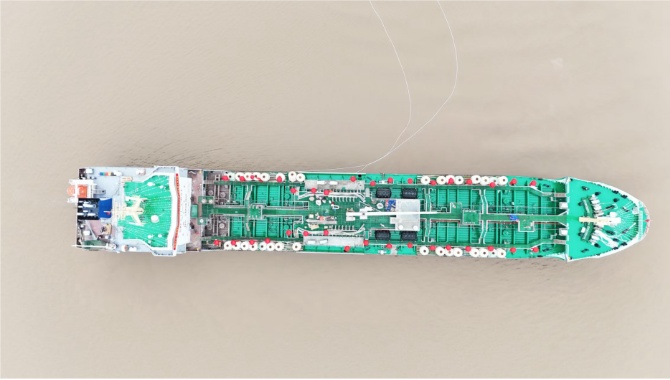 China Launches First Nationwide Methanol Bunkering
China Launches First Nationwide Methanol Bunkering 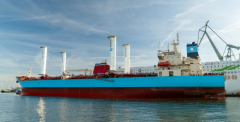 bound4blue completes first eSAIL® installation und
bound4blue completes first eSAIL® installation und  Deck-Capacity Pricing: Why the Forward-Superstructu
Deck-Capacity Pricing: Why the Forward-Superstructu 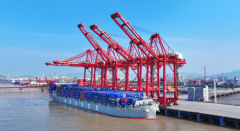 Ningbo Ocean Shipping Announces Order for Four 4,30
Ningbo Ocean Shipping Announces Order for Four 4,30 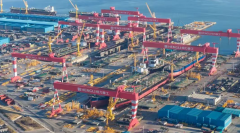 The "Norwegian King of Shipping" Orders Two VLC
The "Norwegian King of Shipping" Orders Two VLC 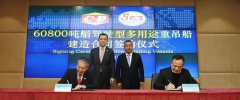 The opportunity has arrived. COSCO SHIPPING Special
The opportunity has arrived. COSCO SHIPPING Special